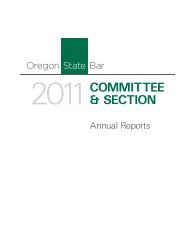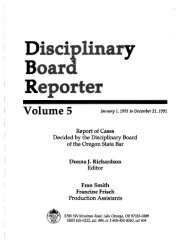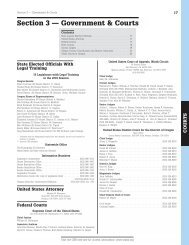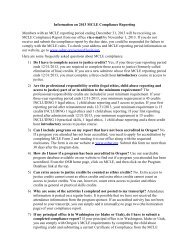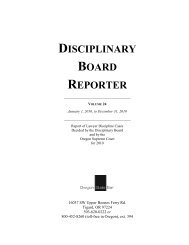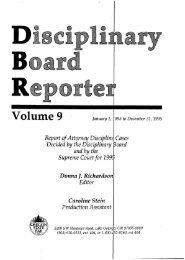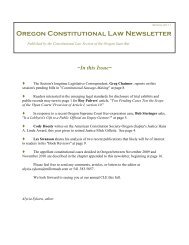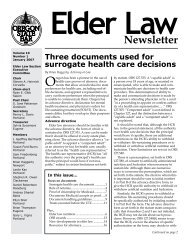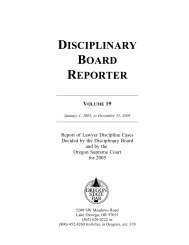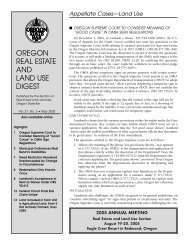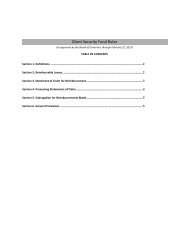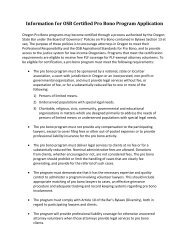February 22, 2013 - Oregon State Bar
February 22, 2013 - Oregon State Bar
February 22, 2013 - Oregon State Bar
You also want an ePaper? Increase the reach of your titles
YUMPU automatically turns print PDFs into web optimized ePapers that Google loves.
C. From the General to the Specific<br />
In addition to reviewing the larger question of the present blanket prohibition on<br />
in-person and real-time electronic solicitation, the Task Force also went line-by-line<br />
through the Current Rules. As we did so, we became concerned that the “laundry list” of<br />
prohibitions contained in current <strong>Oregon</strong> RPC 7.1(a) contained many items that were<br />
either overbroad (in that they prohibited speech that did not have any of the proscribed<br />
effects) or ambiguous (in that they did not, in our view, give sufficiently clear or nuanced<br />
guidance as to what is or is not allowed).<br />
We therefore considered revising the list on a subsection by subsection basis but<br />
ultimately concluded that it would be extremely difficult, in the context of black-letter<br />
rules, to rewrite those prohibitions that we believed were worth keeping in a succinct and<br />
sufficiently helpful manner. The Majority therefore proposes instead the preparation of a<br />
set of comments that will address the issues raised in current RPC 7.1(a) and additional<br />
issues in a way that will provide guidance to practicing lawyers and to the <strong>Bar</strong> in its<br />
disciplinary capacity. Although the <strong>Oregon</strong> Supreme Court has, in the past, expressed<br />
little interest in adopting either the Official Comments to the ABA Model Rules or a set of<br />
such comments modified to fit <strong>Oregon</strong>’s disciplinary experience, we would not expect the<br />
court to object to the publication of these kinds of comments any more than it objects to<br />
the publication of other CLE materials.<br />
The reader will note that the Proposed Rules also contain a number of other<br />
changes. For example, the simplification of the prohibitions on lawyer advertising and<br />
solicitation make it possible to simplify the regulation of firm names and to eliminate the<br />
presently existing special set of exemptions that applied to prepaid legal services plans.<br />
III. Additional Information and Considerations<br />
In summary, the Majority concluded that state, if not also federal, free speech<br />
considerations required a substantial revision of the Current Rules. The Majority also<br />
concluded, however, that this sort of revision makes public policy sense. Of course, the<br />
promotion of free speech is itself a considerable public policy goal that should not lightly<br />
be overridden. This is not, however, our only public policy consideration. For example:<br />
We believe that much public good can be and is accomplished by lawyer-initiated<br />
communications with potential or prospective clients. Restrictions on such<br />
communications therefore be no broader than they need to be.<br />
We believe that most <strong>Oregon</strong>ians, if not also most non-<strong>Oregon</strong>ians with whom<br />
<strong>Oregon</strong> lawyers are likely to come into contact, can do a perfectly good job most of the<br />
time to protect themselves against dishonest or abusive solicitation efforts..<br />
We observed that very few bar complaints alleging more than technical violations<br />
have been filed against <strong>Oregon</strong> lawyers in recent years.<br />
Report of the Advertising Task Force (August 2009) Page 6



